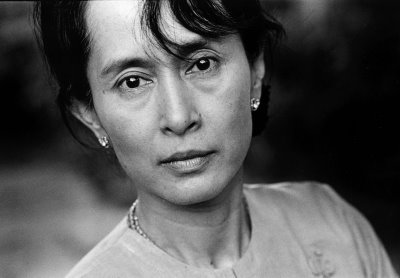Myanmar Writhes in the Grip of Its Junta
A year ago, Myanmar’s junta cracked down on protests by Buddhist monks. This week, the country’s riot police forces organized a show of force in Yangon. More Photos >
YANGON, Myanmar — A year ago, Myanmar’s police and military stormed the streets of this moldy, crumbling city and began a deadly crackdown on thousands of Buddhist monks protesting sharp rises in the price of food and fuel. Now the country’s ruling generals are steeling themselves for a reprise.
Multimedia
As the anniversary approached, the police erected checkpoints on the outskirts of Yangon, formerly Rangoon, and conducted nightly house-to-house searches, usually just after midnight, hunting for dissidents or critics of their rule — anyone who might want to commemorate the protests.
After an explosion on Thursday near Sule Pagoda and City Hall, the focal point of demonstrations last year, heavily armed police officers cordoned off the area, and men in green uniforms patrolled the streets carrying crowbars. A local shopkeeper said four people had been wounded in the blast.
The generals’ domination in Myanmar, formerly Burma, has been tested repeatedly over the past two decades — by the monks last September, by Daw Aung San Suu Kyi, the democracy leader under house arrest, and by a powerful cyclone earlier this year that brought the generals into confrontation with an outside world confounded by their resistance to accepting help.
Yet today, with their principal rivals sidelined, exiled or imprisoned, the generals appear to be at the apex of their power.
“This isn’t a regime on the run or about to fall,” said Charles Petrie, who until last year coordinated the United Nations’ operations here. The generals may seem oblivious to the outside world or out of touch with people’s economic hardships here, Mr. Petrie said. “But in military and security terms,” he added, “they definitely know what’s going on.”
Burmese dissident groups nurture a long-held hope that some sort of regime change will bring greater prosperity to an impoverished population living amid remarkably fertile lands, abundant tropical hardwoods, ample natural gas reserves and many other riches.
But the only foreseeable change is a lot less grandiose: Than Shwe, the senior general who has been in charge since 1992, is now in his mid-70s. Questions about who and what will follow lead to endless and intense speculation here.
Asia has had its share of military dictators in recent decades, but few have been as secretive and all-powerful as Senior Gen. Than Shwe. When the secretary general of the United Nations, Ban Ki-moon, tried to reach him in May to discuss assistance for the victims of Cyclone Nargis, the general neither took nor returned his calls. (After repeatedly trying over several days, Mr. Ban gave up and sent letters instead.)
General Than Shwe has been the key to the resilience of the military government through his masterful but Machiavellian control over fellow officers. In many ways General Than Shwe — singularly — is the government.
“It was one of the strangest things,” said Priscilla A. Clapp, the chief of mission at the American Embassy from 1999 to 2002. “When I would talk to generals who were very high up, they said, ‘Even people at the top don’t know what’s going on.’ No one knows all the things that Than Shwe is doing except Than Shwe himself.”
That utter centrality — reminiscent of the status of the North Korean leader, Kim Jong-il — has led to a fair amount of uncertainty over what kind of leader or political system General Than Shwe will leave behind.
Among his most important powers is controlling the billions of dollars from natural gas sales to Thailand, Ms. Clapp said. The amount will total at least $3.5 billion this year, according to Thailand’s central bank data, and there is no oversight of this money but his own.
The line between government service and personal business is also often blurred. The families of the top generals are involved in many of the country’s largest businesses. In the same vein, Myanmar’s health minister, Kyaw Myint, is also General Than Shwe’s personal physician.
The senior general has managed to stay on top through a series of purges and forced retirements, including a drastic dismissals in 2004 that sidelined Khin Nyunt, a relatively liberal-minded prime minister, and the estimated 1,000 to 2,000 military intelligence officers under the prime minister’s command.
The purges have eliminated many possible successors and created an intellectual vacuum at the highest levels of government. This has also led to a large generational gap between General Than Shwe and his likely successors.
Paulo Sérgio Pinheiro, the United Nations’ special envoy to Myanmar for human rights from 2000 until last year, said there was an obvious lack of international experience at the top echelons.
“They are one of the most ill-prepared elites in terms of dictatorships that you can find in the world,” Mr. Pinheiro said. “They are very isolated.



No comments:
Post a Comment